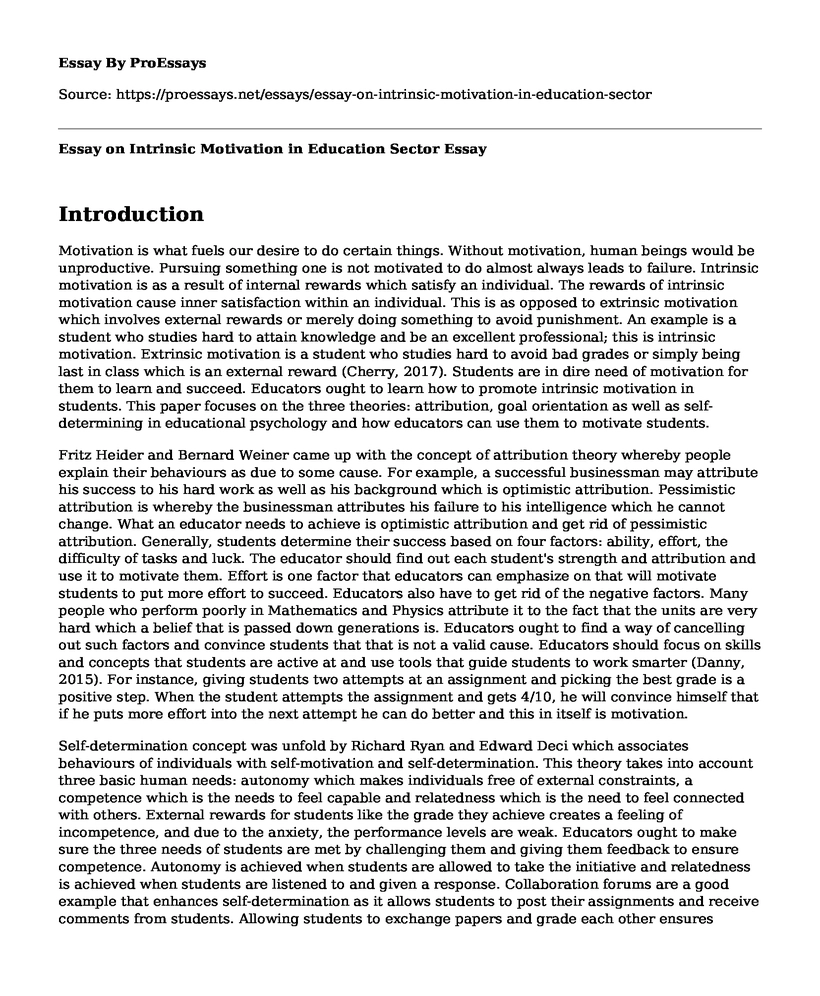Introduction
Motivation is what fuels our desire to do certain things. Without motivation, human beings would be unproductive. Pursuing something one is not motivated to do almost always leads to failure. Intrinsic motivation is as a result of internal rewards which satisfy an individual. The rewards of intrinsic motivation cause inner satisfaction within an individual. This is as opposed to extrinsic motivation which involves external rewards or merely doing something to avoid punishment. An example is a student who studies hard to attain knowledge and be an excellent professional; this is intrinsic motivation. Extrinsic motivation is a student who studies hard to avoid bad grades or simply being last in class which is an external reward (Cherry, 2017). Students are in dire need of motivation for them to learn and succeed. Educators ought to learn how to promote intrinsic motivation in students. This paper focuses on the three theories: attribution, goal orientation as well as self-determining in educational psychology and how educators can use them to motivate students.
Fritz Heider and Bernard Weiner came up with the concept of attribution theory whereby people explain their behaviours as due to some cause. For example, a successful businessman may attribute his success to his hard work as well as his background which is optimistic attribution. Pessimistic attribution is whereby the businessman attributes his failure to his intelligence which he cannot change. What an educator needs to achieve is optimistic attribution and get rid of pessimistic attribution. Generally, students determine their success based on four factors: ability, effort, the difficulty of tasks and luck. The educator should find out each student's strength and attribution and use it to motivate them. Effort is one factor that educators can emphasize on that will motivate students to put more effort to succeed. Educators also have to get rid of the negative factors. Many people who perform poorly in Mathematics and Physics attribute it to the fact that the units are very hard which a belief that is passed down generations is. Educators ought to find a way of cancelling out such factors and convince students that that is not a valid cause. Educators should focus on skills and concepts that students are active at and use tools that guide students to work smarter (Danny, 2015). For instance, giving students two attempts at an assignment and picking the best grade is a positive step. When the student attempts the assignment and gets 4/10, he will convince himself that if he puts more effort into the next attempt he can do better and this in itself is motivation.
Self-determination concept was unfold by Richard Ryan and Edward Deci which associates behaviours of individuals with self-motivation and self-determination. This theory takes into account three basic human needs: autonomy which makes individuals free of external constraints, a competence which is the needs to feel capable and relatedness which is the need to feel connected with others. External rewards for students like the grade they achieve creates a feeling of incompetence, and due to the anxiety, the performance levels are weak. Educators ought to make sure the three needs of students are met by challenging them and giving them feedback to ensure competence. Autonomy is achieved when students are allowed to take the initiative and relatedness is achieved when students are listened to and given a response. Collaboration forums are a good example that enhances self-determination as it allows students to post their assignments and receive comments from students. Allowing students to exchange papers and grade each other ensures relatedness and autonomy (APA, n.d).
Educators can also use the goal orientation theory to motivate students. This can be done by having students set task-oriented goals as well as ego oriented goals. Task-oriented goals seek to have students have mastery over the task. The success is measured by the knowledge of the task, self-improvement and the proficiency in skills and abilities. The disadvantage here comes in when goals conflict and one is prioritized leading to a conflict. Ego oriented theory is meant to enhance competition where students will want to be better than others which can motivate them highly. Students, therefore, work to be the best rather than doing their best. The disadvantage of this theory is that students who continuously come last will lack motivation and it may create unhealthy competition among students (Cerasoli, 2014).
Conclusion
In conclusion, educators should realize the importance of intrinsic motivation to students as opposed to extrinsic motivation. Intrinsic motivation gives students a purpose which is a more long-term as they seek to fulfil their personal goals. The theories discussed have their positives and negatives, but they offer ways in which educators can motivate students, to ensure they have mastery of content. This is by setting goals, attributing their success to their strengths and fulfilling their needs which leads to them putting more effort and working harder leading to better results and an improved education system that is not merely concerned with examinations.
References
Cherry, K., 2017, October 23. Intrinsic Motivation. Verwellmind. Retrieved from: https://www.verywellmind.com/what-is-intrinsic-motivation-2795385
Danny, 2015, March 5. Attribution Theory, Motivation, and Success. Retrieved from: http://depaultla.org/2015/03/05/attribution-theory-motivation-and-success/
American Psychological Association, n.d. Increasing Student Success through Instruction in Self-Determination. Retrieved from: http://www.apa.org/research/action/success.aspx
Cerasoli, C.P. and Ford, M.T., 2014. Intrinsic motivation, performance, and the mediating role of mastery goal orientation: A test of self-determination theory. The Journal of Psychology, 148(3), pp.267-286.
Cite this page
Essay on Intrinsic Motivation in Education Sector. (2022, May 23). Retrieved from https://proessays.net/essays/essay-on-intrinsic-motivation-in-education-sector
If you are the original author of this essay and no longer wish to have it published on the ProEssays website, please click below to request its removal:
- Environmental and Occupational Public Health
- Reason for Evaluating Employee Performance: Case Study
- Executive Secretary Educational Program Paper Example
- BSCI Study on Employee Exposure to Particulates & Gases
- Conflicts in Nursing Practice: Demotivating Quality Healthcare Services - Essay Sample
- Essay Example on Mediation: A Beneficial Dispute Resolution Method
- DNP-Prepared Nurses: Unlocking Interprofessional Collaboration - Essay Sample







